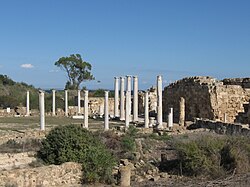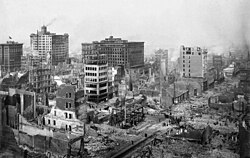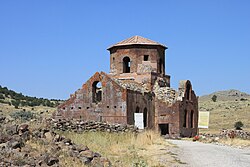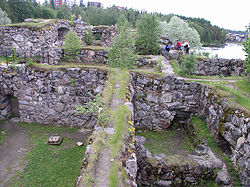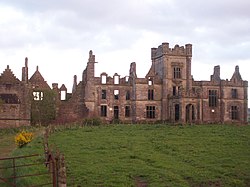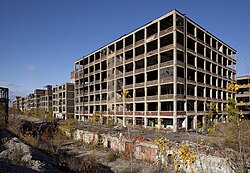Ruins
Ruins Media
The Holy Saviour's Church in Gyumri after the 1988 Armenian earthquake, the strongest earthquake in the USSR in terms of the number of victims
1906 San Francisco earthquake: Ruins in vicinity of Post and Grant Avenue.
Ruins of Whitby Abbey, England
Ruins of Kızıl Kilise, "Red Church" in Güzelyurt
Ruins of Kajaani Castle in Kajaani, Finland
Ury House, Aberdeenshire ruined by removal of the roof after the Second World War to avoid taxation.
Ruins are the parts of buildings that are left after they have been destroyed and cannot be used properly any more. Many ruins are very old like the ruins of the forum of Ancient Rome, or the ruins of Tintagel Castle on the coast of Cornwall. Ruins can be caused by wars or by natural disasters such as earthquakes, fires and volcanos. Sometimes people leave a house or a village to stand empty, and move somewhere else. When this happens, the house or village slowly becomes a ruin.
Studying ruins

Historic ruins are often a good place for archaeologists to search for evidence of the way people used to live. Often the ruins have all sorts of interesting things buried in them. Archaeologists call the things that they find "artefacts". Artefacts might include beautiful artworks, jewellry and gold coins but usually they are ordinary things like cooking pots, mugs, spoons, hair combs, pipes, old shoes, broken toys and rats' nests. Historians use the evidence found by the archaeologists to write about the place and what might have happened there.
Other people who find ruins very interesting are artists. Many artists have drawn or painted pictures of ruined buildings. In the 18th and 19th centuries, pictures of ruins became very popular.
Famous ruins
- The Indus Valley civilisation in India has several ruined cities. The biggest are Harappa and Mohenjo-Daro. They are 5,000 years old.
- The Nile Valley has famous ruined temples of Ancient Egypt such as Temple of Luxor.
- The most famous ruins of Ancient Greece are the temples on the Acropolis at Athens including the Parthenon.
- Rome has many ancient ruins, including the Colosseum and the Forum.
- Pompeii is an Ancient Roman city near Naples that was destroyed in a volcanic explosion. Many things in Pompeii are very well preserved.
- Machu Picchu in Peru is a ruined city of the Inca from the 1400s.
- In England many abbeys were closed down and ruined in the 1500s, and many castles were ruined during the Civil War a hundred years later.
- In Hiroshima the ruins of a building called the Genbaku Dome ("Atomic Dome") stand to remind people of the destruction of the city by atomic bomb in World War II.

